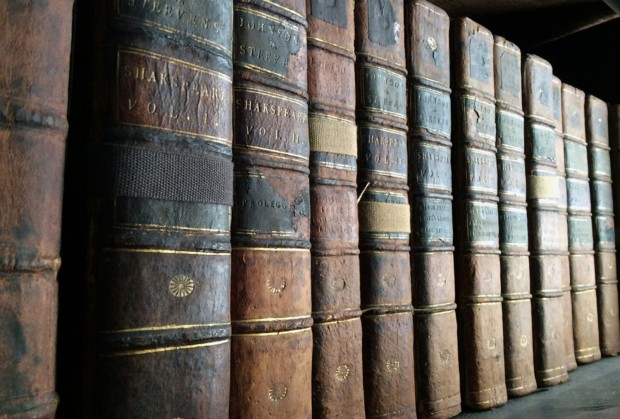Scholar Asserts Doubts on Shakespeare's Authorship Emerged in His Lifetime, Backed by New Evidence

Delve into the ongoing debate surrounding Shakespeare's authorship with new research suggesting doubts emerged during his lifetime. Explore the implications of Francis Meres' early appraisals and Roger Stritmatter's revelations, sparking fresh insights into the Bard's true identity.(Photo : Unsplash/Julian Nortoft)
Shakespeare is revered as a significant figure in the records of literary achievements, with his writings analyzed and honored over many generations. However, contemporary research questions the idea that suspicions regarding his authorship solely arose in the 19th century. An in-depth study of Francis Meres' "Palladis Tamia" brings to attention early doubts, which could potentially alter our perception of Shakespeare's true identity.
Meres' 1598 publication, "Palladis Tamia, Wits Treasury," contains one of the earliest printed appraisals of Shakespeare's works. In a chapter entitled "A Comparative Discourse of our English Poets with the Greeke, Latine, and Italian Poets," Meres extols Shakespeare's poetry and plays, being the first to note Shakespeare as a sonnet writer. The fact that the sonnets by Shakespeare appeared in a manuscript form more than a decade before they were published in 1609 shows how popular they were then.
Meres' statements provided a timeframe for some of Shakespeare's plays and conveyed valuable information about his reputation among his contemporaries that he enjoyed during the 1590s.
Decoding Shakespeare's Identity and Authorship
Roger Stritmatter, an earnest researcher from Coppin State University, meticulously investigates Meres' 1598 publication, uncovering hints that imply an alternative authorship of Shakespeare's works. Meres, a theologian in his era, subtly suggested that 'Shakespeare' could have been a pen name for Edward de Vere, the 17th Earl of Oxford. Stritmatter's thorough findings, extensively documented in the esteemed journal "Critical Survey," disrupt the established narrative and raise significant inquiries regarding academic freedom.
"Palladis Tamia," a 'commonplace book' of comparisons and musings, has long been regarded as a foundational text in Shakespeare studies. Meres' meticulous juxtaposition of English poets with their classical counterparts revealed a potential hidden agenda. While some scholars dismissed Meres as a mere compiler of lists, others, like Don Cameron Allen, hinted at a deeper layer of critical judgment lurking within his work.
Stritmatter's analysis uncovers a pattern of symmetry and imbalance in Meres' comparisons, suggesting a deliberate strategy rather than a random compilation. By decoding the cryptic alignments of names, Stritmatter proposed a startling hypothesis: Meres covertly endorsed the notion that 'Shakespeare equals Oxford.' This revelation challenges established beliefs and underscores the complexity of early modern literary circles.
Ros Barber, a respected scholar at the University of London, acknowledges the significance of Stritmatter's research. While it does not definitively prove Oxford as the actual author of Shakespeare's works, it presents compelling evidence of Meres' tacit endorsement. Against the backdrop of anonymous and pseudonymous publications of the era, such clandestine assertions were not uncommon.
De Vere, a colorful figure in Elizabethan courtly life, is a compelling candidate for Shakespearean authorship. Despite his accolades and controversies, no plays under his name survive. However, historical anecdotes and contemporary critiques hint at a clandestine literary career shielded by the anonymity of the era.
Conspiracies and Debates on Shakespeare's Authorship
In the mid-19th century, American writer Delia Bacon sparked the first significant conspiracy surrounding Shakespeare's authorship. Bacon suggested that the Bard of Stratford-upon-Avon was not the actual author of his works. Bacon proposed that either Sir Walter Raleigh or Sir Francis Bacon was the actual writer. In her quest for evidence, Bacon went to extreme lengths, including attempting to excavate Shakespeare's grave. However, her efforts yielded little support for her claims.
The Oxfordian theory, championed by figures like J. Thomas Looney and supported by luminaries such as Sigmund Freud and Roger Penrose, gains renewed relevance in light of Stritmatter's findings. The notion of an aristocrat writing under a pseudonym to evade social stigma resonates with the clandestine nature of literary production in Elizabethan England.
Critics like Alan Nelson remain skeptical, dismissing Stritmatter's interpretation as overly speculative. To Nelson, Meres' work amounts to nothing more than a catalog of names devoid of deeper meaning. Yet, the ongoing debate underscores the multifaceted nature of Shakespearean scholarship, where every clue invites scrutiny and interpretation.
The importance of Meres' Palladis Tamia extends beyond its apparent contents to its potential concealed subtleties and underlying motives. As researchers persist in deciphering the enigmas surrounding Shakespeare's authorship, one fact remains evident: the pursuit of truth is as captivating as the Bard's enduring narratives.
RELATED ARTICLE: NSW State Library Unveils Shakespeare's First Folio: 400-Year-Old Book Emerges from the Vault
© 2023 Books & Review All rights reserved.
Popular Now
1
Books to Read After 'Fourth Wing': Top Picks for Fantasy and Romantasy Fans

2
‘The Secret Public’ by Jon Savage Book Review: An Insightful Look Into the LGBTQ Influence

3
Stephanie Regalado's 'If They Only Knew' Column Is Now A Book, Unleashing 60 Anonymous True Stories to Empower Women

4
'No Wire Hangers' Scene That Almost Did Not Happen: New Book Reveals Faye Dunaway's Struggles

5
Rare First Edition of Aphra Behn's Novel 'Oroonoko' Discovered in Kent: A Historic Literary Find

Latest Stories
Book Reviews
‘The Secret Public’ by Jon Savage Book Review: An Insightful Look Into the LGBTQ Influence

Book News
Stephanie Regalado's 'If They Only Knew' Column Is Now A Book, Unleashing 60 Anonymous True Stories to Empower Women

Book News
'No Wire Hangers' Scene That Almost Did Not Happen: New Book Reveals Faye Dunaway's Struggles

Book Reviews
‘The Perfect Couple’ by Elin Hilderbrand Book Review: A Captivating Summer Mystery

Book News
New Book ‘The Franchise’ Reveals Penguins President Kyle Dubas’ ‘Biggest Mistake’ as Maple Leafs GM











